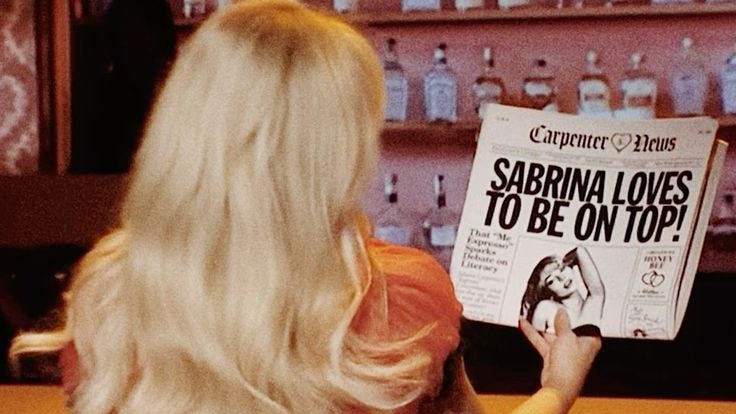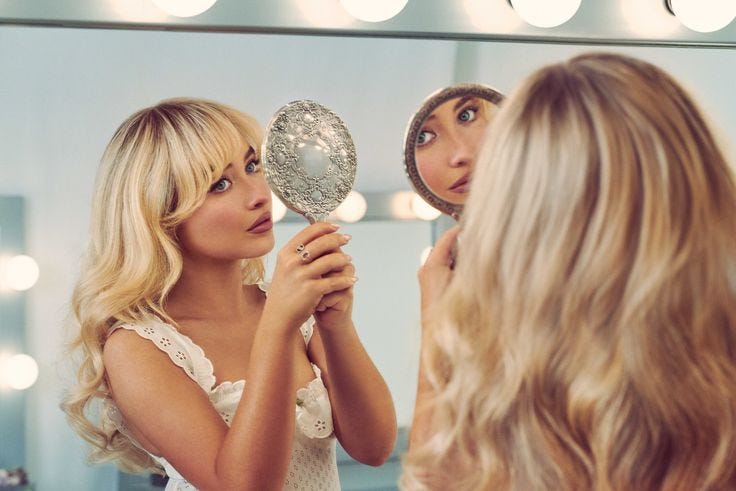another day, another sabrina carpenter discourse
do we know what the male gaze or lolita aesthetic means?
every day on jaboukie’s internet, pop star sabrina carpenter is the main character. this time, the thinkpieces (mine included) center the cover of her next album, man’s best friend. the controversial photo shows carpenter on her knees, in a bow-tied dress, kneeling by a man’s leg while he holds her hair. between the pose and the title, we can only assume it’s a play on dog-ism—or, if you’re familiar, pet play.
i don’t have any doubt that controversy is part of her brand; if not controversy, then at least being cheeky. she’s our modern-day pamela anderson! she’s giggling while twirling her hair, dropping into sex positions in her set routine, writing hits about her man-child ex-boyfriends. for as long as carpenter’s been in the Spotlight (capital s), she’s also been the subject of feminist discourse. she’s been making music long before she opened for taylor swift on the eras tour, but it wasn’t until emails i can’t send that she became a certified pop star.
sabrina carpenter, the brand, leans into sex. she wants you to know that she fucks and she likes it. she invites you to lean into the playfulness, whether you’re a dom, sub, or vers. depending on your views of 2nd- and 3rd-wave feminism, this is either progressive or offensive. the two overwhelming camps of opinion boil down to:
can’t a girl be horny? she’s a woman embracing her sexuality! she’s a girl’s girl.
she’s leaning into regressive politics in a time when women’s rights are being stripped away.
at the risk of sounding contrarian, i think both parties have some points while also missing the point entirely. a few months ago, this substack critiquing sabrina’s brand went viral. i agreed with some points (the colonization of femininity), disagreed with others (her being pedobait). but the comments were particularly illuminating. you would never have this level of productive conversation on twitter or facebook. should you disagree, we can talk without using combative language.
let’s dive in.
going against the male gaze is still centering the male gaze.
along with narcissistic, toxic, gaslighting, add ‘male gaze’ to the lexicon of misunderstood buzzwords. coined by scholar laura mulvey for film theory, the male gaze is loosely defined as “depiction of women through a masculine and heterosexual viewpoint, often objectifying them only as objects of sexual desire.”
key word: only. in mulvey's essay, she describes that women, through the male gaze, are seen as passive creatures whose sole purpose is to please men. there is a lot of bad media that does play into the male gaze, but carpenter is a grammy-winning musician who is consistently adding to her already impressive résumé. when i think of sabrina carpenter, i don’t think of someone reliant on male approval—she’s been the sole architect of her musical, acting, and commercial success.
what she does do is present herself as an enthusiastic sexual creature—which is often celebrated if you do it in private, but condemned if you trot it out in public. there are many, many women who prefer to take a more submissive role in intimate acts. there are many, many women who have kinks that, without the explicit consent of both parties, are deemed regressive. i’m not a devoted carpenter follower, but her promiscuity is fairly tame given our broader puritan history.
(it seems that anytime a celebrity leans into sexuality, particularly into sub/dom roles, the assumption is that only the dom (in this case, a male) receives pleasure. this is a misunderstanding of bdsm dynamics, but the feminist politics of kink and fetishes is another essay for another time.)
if she were to pivot away from what’s regarded as the male gaze (in this case, anything remotely sexual), it would still be centering the male gaze. living in opposition to a belief is still giving that belief power. there are many, many interesting conversations to be had about which women are able to lean into promiscuity for profit (versus women of color who cannot), but we’re not having those talks. we’re debating amongst ourselves about sabrina’s relationship with men and their gaze.
(sidenote: heterosexual men don’t need lingerie and overt sex references to think of women in a sexual light. this idea that women posing seductively and submissively taps into a primal, uncontrollable part of the male mind is the same argument people use to defend sex crimes.)
if it boils down to a matter of preference (not wanting your preteen to attend a concert where she’s acting out sex positions—fair!), then we must admit that we may dislike an image or choice without there being a lethal moral reason for it.
we must find other references for women and sex besides lolita.
somewhere, vladimir nabokov is rolling in his grave. it’s been decades and people are still willfully misunderstanding lolita. his book, the OG ‘depiction is not endorsement,’ is about a minor who is sexualized by an old man obsessed with her doll-like appearance. language arts programs are getting cut all over america because now, colloquially, lolita is a stand-in for youthfulness and sexuality.
nevermind the fact that carpenter is 26-years-old.
the constant accusations that she’s problematically leaning into the lolita aesthetic say less about our understanding of the novel and more about how we perceive women who are short with round cheeks. at 5’0", regardless of how she dresses, carpenter will be grouped into the childlike camp. i’m 5’2" and got mistaken for a high schooler last week (i’m 28). same with her facial features—the woman has a heart-shaped face; what do you expect her to do about it?
presumably, carpenter and her team are not unaware of the criticisms or comparisons. i don’t even disagree with the fact that she has leaned into intentional nymph aesthetics for marketing (see: her skims campaign). but lolita did not invent mini dresses and heart accessories. it did not even invent women coming into sexual desires in a way that’s both conflicting and inevitable.
what feels counterproductive is comparing her every move to lolita. we are having a cultural obsession with girlhood (mostly from women in their 20s and 30s) while still selling sex, but it’s reductive to say she’s pedo-baiting. notably, one of the main points of lolita is that humbert sexualizes dolores regardless of what she does or wears. everything she does is erotic to him. in that way, carpenter does have similarities with lolita. she doesn’t dress like a woman pretending to be a girl pretending to be a woman. she dresses like a woman who has leaned into the same sex appeal aesthetic that thousands of musicians (ie. adam levine, lenny kravitz, alex turner, etc), have done before her. if you’re going to crucify her, then you must throw out the whole system.
short of disavowing sex altogether, carpenter was always going to get the lolita comparisons just by virtue of her physicality. there is a more interesting conversation to be had about hyper sexuality as a marketing tactic, but please, we desperately need better references for it besides lolita. there are other texts!
are women responsible for what the patriarchy does to us?
it’s a complicated question. women can align themselves with the patriarchy for their perceived self-interest (see: serena joy in the handmaid’s tale). women can throw other women under the bus for more proximity to power (see: white women voting for trump). women can engage with other women through the lens of patriarchy, which is often just shaming and assigning worth to christian values. but are women ultimately responsible for the material violence that we experience with men?
i mean, i’m going to say no!
it’s a bad time to be a woman, especially in the united states, and especially if you are trans, disabled, or not a u.s. citizen. there is a lot of understandable outrage at the regressive politics happening in this country; i know because i’m mad too. it does feel like we rolled back the days of liberal feminism (which i hated at the time, but now miss) right back into the 1950s. the tradwife, i’m just a girl who doesn’t know anything movement is genuinely disturbing. but i don’t necessarily see carpenter as an accessory to that.
she is, if anything, a casualty and an outlet for our upset.
the most common critique of carpenter’s image is: “how could she do this when women’s rights are _______ (insert terrible, true thing happening here)?” but is there actually a direct correlation between what a pop star is doing versus the very real impact that men’s rights activists like andrew tate have on our youth? i’ve seen more vitriol directed toward carpenter than i have toward andrew tate, dave portnoy, and the hundreds upon hundreds of men who are actively churning out anti-women content. how much of this selective outrage is rooted in actual analysis—and how much of it is just low-hanging fruit?
carpenter is a visible public figure, but she’s neither as influential nor as intentionally propagandistic as someone like andrew tate. who, last i checked, is actively 1) a sex offender, 2) has infiltrated the minds of young men to a disturbing degree that teachers are concerned, and 3) has created an entire ranking system for women based on their “high/low worth value.”
every public figure, regardless of gender, is subjected to interpretation. it’s part of why we do follow celebrity and pop culture—it’s a mirror to our psychology and norms. i’m not even suggesting carpenter be immune from analysis. i’m just a former slash occasional culture reporter with some thoughts.
ultimately…
think what you want. listen or don’t listen. i don’t know sabrina personally nor am i even particularly inclined to defend her aesthetic choices (they’re fine! she’s not reinventing artistic choices, but not everything has to be groundbreaking!), but i am curious about the expectations female public figures are expected to consciously or unconsciously meet. as always, i just like thinking about why we think the way we do.







One of the most refreshing povs i’ve seen in this discourse. We often, especially among women, fall into this ongoing narrative of criticism and categorization—constantly debating which version of feminism suits us best in the moment. We tend to villainize other women and completely overlook where (or from whom) the system of female objectification originates—a system that never truly ends. I believe she has always been explicit and open about her sexuality, yet the same discourse is endlessly perpetuated.
When it comes to short women with round faces:
All my life, I’ve struggled with comments about having a “baby face.” I’m 21, and the number of crude, unsettling remarks I’ve received—specifically from middle-aged men—about my age and appearance is absolutely disturbing. It has deeply impacted how I see myself and has shaped my personal journey between girlhood and womanhood.
perfect commentary on this ! thank you queen